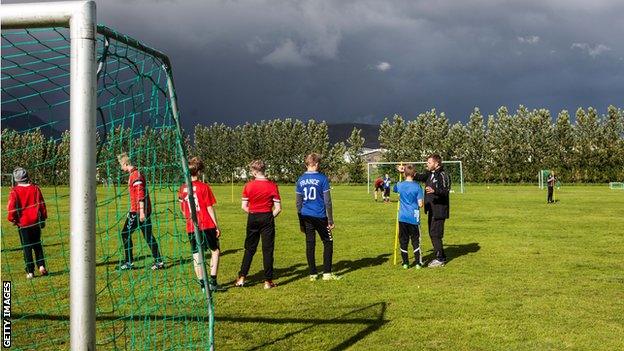Scottish Youth Football Association urges members to ban heading for under-11s
- Published

The SYFA had previously recommended against repetitive heading
Footballers under the age of 11 should not head the ball in training and it should be eliminated from games "as far as possible", the Scottish Youth Football Association has said.
The guidance comes after research conduced by Glasgow University found footballers are three-and-a-half times more likely to die from dementia.
Glasgow's largest youth football club, Giffnock Soccer Centre, has responded by banning the heading of footballs across all of its smaller-sided teams up to seven-a-sides for under-11s.
The SYFA states that, while there is "not yet a definitive link between heading the ball and brain injury", the advice has been drawn up as "a precaution".
National secretary Florence Witherow said: "The SYFA has previously recommended against training drills that encourage repetitive heading of the ball. However, in light of Dr Willie Stewart's recent study, we have updated and strengthened the advice to our clubs."
She pointed out that it becomes the first football body in Scotland - and one of the first in Europe - to issue such advice.
"We would also take this opportunity to remind all of our coaches and officials that, if any player, at any age group, is suspected of having a concussion, they must immediately cease playing," Witherow said.
"Coaches and officials are reminded of NHS advice on head injuries and should seek immediate medical advice if symptoms continue or worsen, or if a player is suspected of having lost consciousness."
Witherow said that the SYFA would hold further discussions with Dr Stewart and work closely with the Scottish FA over possible additional recommendations.
'We're parents first and coaches second'
Giffnock, which has a membership or 1200 players and 200 coaches, took their decision because "as a community club, we're parents first and coaches second", chairman Craig Inglis told BBC Scotland.
"In light of the available medical evidence, we feel a responsibility to safeguard the future health of our youngest players," he said.
"We will be following the issues very closely and the policy with regards to the older age groups remains under close consideration."
Giffnock anticipate that the SYFA will eventually "change the laws of the game for all young people".